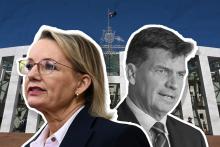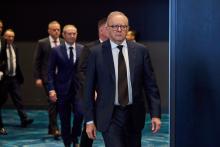With early voting open and polling day just nine sleeps away, Business News looks at what the major parties are offering to voters.


With early voting open and polling day just nine sleeps away, Business News looks at what the major parties are offering to voters.
Housing
Housing has become a core issue of this election, with both major parties promising to take decisive action.
But some experts have warned policies, both ALP and LNP, have been too demand-side driven and would do little to make housing more affordable for Australians.

Coalition
Under a Coalition government, first home buyers would be allowed to access $50,000 of their superannuation to help with the deposit.
First home buyers would also be allowed to claim tax deductions on interest payments for new homes for the first $650,000 of the mortgage, for up to five years, if they live in the property.
That scheme would be capped to those earning up to $175,000 for individuals, or $250,000 for joint applicants.
The Coalition has also pledged some $5 billion to build critical infrastructure to support new housing developments – including water, power and sewerage. The Coalition says this would help build 500,000 new homes.
A two-year ban on foreign investors and temporary residents purchasing existing homes would also be put in place, and changes to the National Construction Code would be frozen for 10 years.
Labor
Labor has set an ambition target of building 1.2 million new homes by 2029 – 240,000 new homes each year, 20,000 homes each month, or 657 new homes each day.
In WA terms, that’s a new home for each attendee at a capacity Optus Stadium crowd, every three month – two new homes per attendee if it’s a West Coast Eagles crowd.
To do that, a Labor government would set aside $10 billion to build 100,000 new homes reserved only for first home buyers.
The Albanese government’s Home Guarantee Scheme would also be expanded from 2026, allowing any first home buyer – regardless of income or value of the home – to purchase a property with just a 5 per cent deposit.
The party’s Help to Buy shared equity scheme, which would see the government pay up to 40 per cent of the upfront cost of a home for first home buyers in exchange for a share of the property.
Those on the scheme would not be required to pay rent on the portion of the home owned by the government, but the government’s equity contribution would be paid down of overtime, or when the property is sold.
Labor has also set aside $54 million for targeted investment in advanced manufacturing of prefabricated or modular home construction; $120 million to incentivise states to remove red tape and build homes faster; and $78 million to fast-track qualification of 6000 tradies.
Greens
The Greens have committed to establishing a federally owned public property developer to rent and sell homes below market price.
Under that policy, 70 per cent of homes would be offered as rentals – with rent capped at 25 per cent of household income or 70 per cent of market rent, whichever is lower.
Some 30 per cent of those homes would be sold “just over” the cost of construction.
The Greens would also establish a National Renters Protection Authority with powers to investigate “bad landlords” and issue fines.
Rent increases would be capped at two per cent every two years.
The Greens would also use $5.2 billion over four years to deliver 50,000 tenancies for homeless people or at-risk youth, and to double federal funding provided to states and territories for homelessness services and community housing.
Negative gearing – which allows owners to deduct the cost of running a rental against taxable income - would be scrapped; and the 50 per cent discount on capital gains tax would be scrapped.
Existing negative gearing and CGT incentives would be allowed for one investment property already owned before the policy change.
The Greens would legislate to place a ceiling on mortgage interest rates of one per cent above the cash rate.
Mining, energy and climate

Coalition
The Coalition will introduce an East Coast Gas Reservation, which would require around 20 per cent of current east coast gas demand to be committed to the domestic market.
The party has also committed to “flooding the market” with more gas to drive bills down.
To do that, it has promised a fast-tracking of new gas projects – including a commitment to decide on WA’s Northwest Shelf project within 30 days of forming government; and to impose levies on gas companies which prioritise exports over domestic supply.
The Coalition has also promised to build seven nuclear power plants, at an estimated cost of $331 billion, on old coal-fired power plant sites, including in Collie.
Labor
Labor’s energy policy aims to deliver on a commitment to reach 82 per cent renewable energy across the grid by 2030.
To achieve this, Labor would invest a further $2 billion in the Clean Energy Finance Corporation.
On energy prices, Labor is offering voters a one-off $150 on energy bills and has pledged $2.3 billion to subsidise the cost of solar batteries for households by 30 per cent.
Just eight days out from the election, Labor has also unveiled its plan to create a critical minerals reserve.
The reserve will be stockpiled through optional offtake agreements with domestic producers, and boosted via a $1 billion injection in the Morrison-introduced critical minerals facility.
Greens
The Greens plan to have Australia running on 100 per cent renewable energy by 2030.
To do so, the party would seek to ban all new coal, oil and gas projects – and cancel existing exploration permits.
The party would also seek to ban fossil fuel political donations, advertising and sponsorship.
Public transport fares would be capped at 50 cents nationwide, rebates of up to $10,000 would be offered on electric vehicle purchases, and net zero by 2035 would be legislated.
Health

Labor
Labor has led its campaign with an $8.5 billion Medicare spend, which would include $400 million to train new nurses and doctors, and a $644 million investment to open 50 new urgent care clinics.
The party has also committed $790 million to women’s health, which will be used to open 11 new endometriosis and pelvic pain clinics, as well as to add IVF, contraceptive and endometriosis medication to the Pharmaceutical Benefits Scheme.
Copayments for PBS medicine would also be capped at $25, down from the current $31.60 from January 2026; and $7.70 for concession card holders.
Some 100 free mental health clinics also formed part of the ALP’s health plan, with a $1 billion investment used to open the clinics and train 1200 mental health professionals.
Coalition
The Coalition was quick to match Labor’s Medicare pledges, adding a further $400,000 in financial incentives for junior doctors to enter general practice.
A Dutton-led government would also raise the cap on subsidised psychology sessions for 10 to 20 per year and has matched the women’s health and PBS commitments made by Labor.
Greens
At the core of the Greens plans for healthcare is a plan to add dental to Medicare, at a cost of $195 billion.
The Greens also committed $31.7 billion to open 1000 new free healthcare clinics across the country.
Business and industrial relations

Coalition
The Coalition kicked off its pitch to small business by pledging lift the small business instant asset write-off to $30,000 and make it permanent.
Several other small business tax incentives have been offered up by the Coalition, including an entrepreneur accelerator scheme, in which businesses would pay tax on 75 per cent of the first $100,000 of taxable income and 50 per cent on the second $100,000.
Small and medium business will also be able to claim some $20,000 in staff meals each year.
Mr Dutton has also pledged to cut 41,000 Canberra public servant jobs, and repeal Labor’s Right to Disconnect laws.
A Coalition government has also promised to “curtail union militancy” through creation of a tougher Australian Building and Construction Commission.
Labor
Labor stopped short of committing to a permanent instant asset write-off, instead committing to an extension of the current $20,000 arrangement for one year.
A ban on non-compete clauses in employment contracts of low- and middle-income workers – currently defined by Fair Work as anyone below $175,000 per year (indexed annually) – was also promised by Labor.
An Albanese government would also legislate to protect and make permanent penalty rates.
Greens
The Greens want to extend pro-rata entitlements to sick leave, annual leave and carer’s leave to casual workers; move to a four-day work week with no loss of pay; and introduce a mandatory notice period for roster changes.
Superannuation would also be guaranteed for anyone under the age of 18, regardless of how many hours they work.
Cost of living

Labor
Aside from the $150 of energy bill relief mentioned in the energy section above, Labor has also committed to two one per cent tax cuts for all Australians. One per cent in the 25/26 financial year, and another one per cent the year after.
It would result in anyone earning over $45,000 saving $268 in FY26, and $536 in FY27.
Labor has also committed to wiping 20 per cent off all student debt, raising the repayment threshold and lowering the repayment rate.
Three days of subsidised childcare will be guarantees for all families under a Labor plan to scrap the activity test – which previously required parents work or volunteer for a set number of hours each week before earning the subsidy.
And a Labor will offer all workers a $1000 tax deduction for work related expenses – even without receipts or paperwork.
In December, Anthony Albanese also pledged to offer low interest loans for workers earning less than $100,000 per year to buy electric vehicles as part of a $150 million program – although that policy has mysteriously disappeared from the party’s commitment list.
Coalition
The Coalition has vowed to repeal Labor’s tax cuts, instead promising a reduction of the fuel excise from 50.8 cents per litre to 25.4 cents per litre, for one year.
The fuel policy is estimated to save a one-car household around $14 per week – or $700 over one year.
The Coalition has also promised to scrap the New Vehicle Efficiency Standard, which planned to introduce penalties for high-polluting vehicles from July 1.
Mr Dutton said those penalties would have seen the cost of a Ford Ranger ute shoot up $14,400, although it’s unclear exactly how that was calculated.
Mr Dutton has also mentioned action on tackling bracket creep – indexing income tax brackets to rise in line with inflation – although no firm commitment has been made.
Greens
The Greens have touted a $29 billion spend to give all families access to 50 hours of free childcare per week, as well as extending pre-school hours to 30 per week.
Aforementioned Greens housing policies including capping rental increases also form part of the Greens cost of living pitch, as well as the previously mentioned 50 cent caps on public transport.
To fund this, the Greens say they would introduce a 10 per cent tax for 150 of Australia’s wealthiest people.
Defence

Coalition
The coalition has pledged to lift Australia’s defence spending to 3 per cent of gross domestic product within a decade, in line with US requests.
In the short-term, Mr Dutton says that would be achieved by increasing defence spending by $21 billion over the next five years – lifting investment from the current 2 per cent to 2.5 per cent of GDP.
That commitment is inline with a key US defence advisor, Elbridge Colby, who told a US Senate committee in March that the US “should press” its defence spending concerns with Australia.
The Coalition also remains committed to the AUKUS agreement.
Labor
Labor had a more modest defence commitment, instead opting to raise defence spending to 2.33 per cent of GDP in the decade to come.
Like the Coalition, Labor remains committed to the AUKUS agreement.
Greens
The Greens would like to the AUKUS agreement with the US and UK cancelled entirely.
Migration
Coalition
Peter Dutton has pledged to cut permanent migration intake by 25 per cent, or 45,000 visas, if elected.
He has also promised a 25 per cent reduction in the cap on the number of foreign students studying at metropolitan universities, which is estimated to result in 30,000 fewer students each year.
Mr Dutton has also committed to the introduction of a two-year ban on foreign investors and temporary residents buying existing homes.
Labor
Labor has not made any new announcements regarding student migration during its campaign, after it attempted to introduce international student caps last year – a 270,000-student cap – which was blocked by the Coalition and the Greens.
Labor has committed to matching the Coalition’s plan to ban overseas investors from buying established homes for two years.












